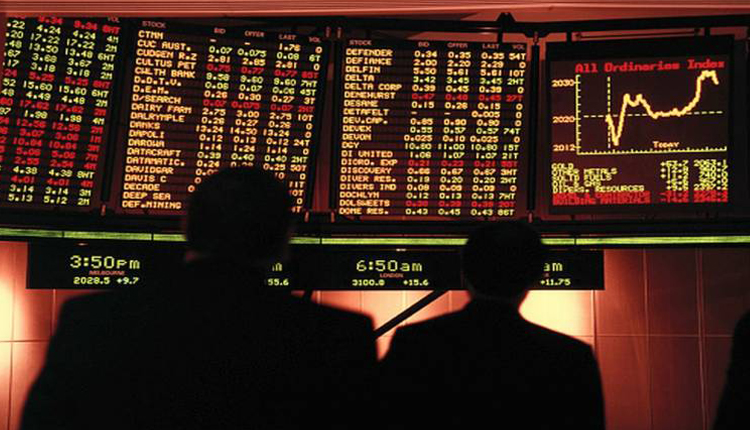Asian markets slipped on Friday as investors remained wary amid heightened tensions between the United States and China, and uncertainties surrounding U.K.’s divorce negotiations with the European Union.
Mainland Chinese markets were among the biggest losers in the region, in terms of percentage declines. The Shanghai composite fell 2.49 percent to close at around 2,579.48 while the Shenzhen composite declined by 3.657 percent to 1,335.15.
Hong Kong’s Hang Seng index also slipped 0.48 percent during its final hour of trade.
“Concerns over trade tensions continue to build up ahead of the meeting between Donald Trump and Xi Jinping that is to happen on the side-lines of the G-20 meeting next week,” said OCBC Treasury Research in a note.
South Korea’s Kospi was lower by 0.6 percent to close at 2,057.48, with shares of industry heavyweight Samsung Electronics slipping 0.12 percent.
Australia’s benchmark ASX 200 closed 0.44 percent higher at 5,716.2, with the heavily weighted financial subindex gaining 1.08 percent.
Shares of major mining stocks Down Under were mostly down: Rio Tinto fell 0.31 percent and BHP declined 0.72 percent. Fortescue, on the other hand, was higher by 0.25 percent.
Japan’s markets were closed on Friday for a public holiday.
Oil prices continue decline
Oil prices fell on Thursday after U.S. inventories rose to their highest level since December, sparking fresh concerns about a global supply glut. But trading was thin because of the Thanksgiving holiday in the United States.
Global benchmark Brent fell 96 cents to $62.52 a barrel while U.S. crude declined 78 cents to $53.85.
During the afternoon of Asian trading hours, the decline in prices continued. U.S. crude futures fell 2.21 percent to $53.42 per barrel while Brent slipped 0.78 percent to $62.11 per barrel.
One economist, however, told CNBC’s “Squawk Box” on Friday that oil prices are “probably overshot now.”
“We were negative on oil a month back, saying it would come down. But it looks like … it’s overshot marginal production cost and probably now you’ll see the opposite happening. There’ll be a supply squeeze and prices will rebound over the next two or three months,” said Richard Jerram, chief economist at Bank of Singapore.
Stocks in the sector were mixed on the back of the fall in oil prices.
Energy shares in Australia were mixed on the day, with Woodside Petroleum rising 0.78 percent while Santos slipped 0.35 percent and Beach Energy was down by 1.61 percent.
Oil-related stocks in South Korea, on the other hand, were mostly negative. SK Innovation slipped 2.43 percent and GS Holdings declined by 1.54 percent.
Over in China, PetroChina shares fell 1.16 percent while China Petroleum & Chemical, also known as Sinopec, slipped 1.18 percent.
Fresh Brexit uncertainties
A text outlining the future relationship between the European Union and the U.K. was leaked on Thursday.
The draft text is now being pored over by representatives of the EU’s 27 remaining members. If an agreement can be found, the heads of state will sign off on the document Sunday.
One key statement within the text is the declaration that both parties have “a trading relationship on goods that is as close as possible.”
“As observers looked at this 26 page statement of intent document it still raised as many questions as answers, with grave doubts that it would get support in the Commons,” David de Garis, a director and senior economist at the National Australia Bank, said in a morning note.
“It didn’t seem to be a document that was going to get the support of the Tory Brexiteers nor the pro-Europe Tories,” he said.
Opposition Labour Party leader Jeremy Corbyn has lashed out at British Prime Minister Theresa May’s deal, calling it the “worst of all worlds.”
US takes aim at China’s Huawei
The U.S. government is attempting to sway companies that sell wireless and internet services in allied countries to stay away from telecommunications equipment from China’s Huawei Technologies, according to the Wall Street Journal which cited people familiar with the situation.
The Journal reported that U.S. officials have informed their government counterparts and telecom executives in allied countries where Huawei equipment is already in wide use, about what they see as cybersecurity risks.
Earlier this year, U.S. intelligence chiefs cautioned Americans from buying smartphones made by Huawei because they could be spied on by the Chinese government.
Currencies
The U.S. dollar index, which tracks the greenback against a basket of its peers, was at 96.484 after declining from levels above 96.7 yesterday.
The Japanese yen, widely seen as a safe-haven currency, was at 112.84 against the dollar, after strengthening from lows around the 113 handle yesterday. The Australian dollar traded at $0.7245 after touching a high of $0.7257 earlier.
Source: CNBC


